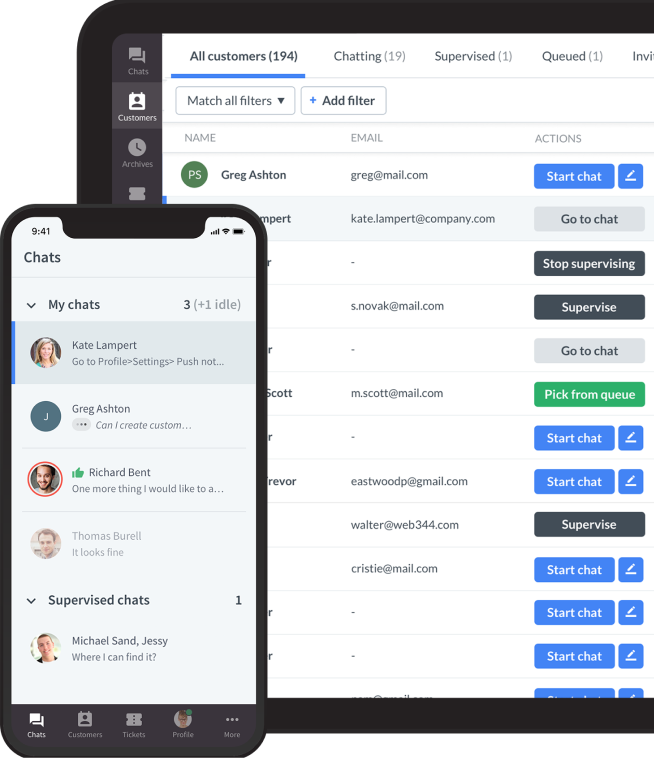
I asked our sales reps about the skills they consider crucial in their daily work. One of the answers was an outlier, and it only said “Money.” Baffled at first, I thought about all the sales reps and managers I’ve worked with, and I realized that what they ultimately value the most is money.
Don’t get me wrong — I’m not trying to paint a picture of sales reps being greedy or anything like that. It’s their most important key performance indicator, and chasing dollars is their way to succeed.
But what comes before money? What skills do sales reps need before they’re so confident they label money a skill?
Soft sales skills that'll help your team better connect with leads
While intangible and sometimes overlooked, soft skills are the lifeblood of successful customer interactions. They help to build positive relationships, foster trust, and make your sales process smoother.
Empathy
Empathy is a sales skill that lets your team step into your customers' shoes, understand their challenges, and care about finding the best solutions for them. It's about going beyond the transactional and building trust through genuine human connection.
While dealing with a customer expressing frustration about a recurring issue, an empathetic sales rep will take the time to understand and show concern. They might say, "I understand how frustrating it is to encounter this issue repeatedly. Let's work together to find a long-term solution that addresses your needs."
Encourage your sales reps to listen attentively and respond with care and understanding. By demonstrating empathy, the sales professional builds trust and strengthens the customer's confidence in the company, which results in relationship building, increased customer loyalty, and higher chances of repeat business.
Active listening
Listening is an art, especially in sales. It’s about understanding the underlying meaning and emotions behind words. During a sales meeting, an active listener pays full attention to the customer's needs, asks probing questions to gain deeper insights, and takes notes so nothing is missed.
They respond with thoughtful follow-up questions and paraphrase the customer's concerns to demonstrate their understanding. It's about making the customer feel heard and valued.
When potential customers express their needs and preferences, an active listener will not only hear the words but also pay close attention to the customer's tone, body language, and underlying emotions.

When I talked to Piotr Sarzyński, Professional Services Team Leader at LiveChat, he added:
“It’s crucial to listen to understand rather than to respond. This shows your intrinsic curiosity and makes the customer feel taken care of, helps nurture relationships, and enables you to stand out from the competitors.
“Most importantly, you can find out what the customer needs — from their personal, career, and company point of view. This, of course, isn't as simple as rephrasing what the client said to show you're with them. It's an art that's pretty complex to master — how to lead the conversation, what questions to ask, which to follow up on, when to shut up, and so on.
“I’ve tried to become better and better at this with every sales call. In some cases, it led to discovering upsell potential or discovering what we could improve in our product and sales process to keep the customer with us.”
Communication
From face-to-face conversations to persuasive emails, your team's communication skills can make or break a sale. Effective communicators can convey complex information in a simple and relatable manner, leaving a lasting impression on customers.
When presenting a product to a potential customer, a skilled communicator uses language tailored to the customer's industry and needs. They highlight the key features and benefits, using presentation skills to vividly show how the product can solve the customer's challenges. They also adapt their communication style to match the customer's preferences, whether a technical discussion or a casual conversation.
Your team needs to articulate the value of your product or service in a way that resonates with customers, and clear, concise, and effective communication is the key to doing that.
Hard sales skills that'll help your team close more deals
Soft skills may be the bridge to your customers, but hard skills are the vehicle that navigates the route to sales success. These sales tools empower your sales reps to implement their sales sales strategy effectively and achieve sales goals.
Product knowledge
Your sales team should know your offering inside out, including its features, benefits, and how it solves your customers' pain points. With deep product knowledge, they can address customer questions, overcome objections, and position your offering as the perfect solution.
When a customer asks specific technical questions about a product, a sales professional with solid product knowledge provides detailed and accurate explanations, highlighting how the product's features align with the customer's needs and showcasing its competitive advantage.
This expertise builds credibility and reassures the customer that they are making an informed decision. To increase customer trust, position your product effectively, and improve conversion rates, your team should undergo thorough product training and understand your offerings' features, benefits, and unique selling points.
Market research
Market research lets your team identify potential opportunities, anticipate customer needs, and adjust sales strategies accordingly. It's about being proactive and well-informed, ensuring your team is always one step ahead.
Let's say your team is targeting a specific industry. They uncover a trend indicating that companies in that industry struggle with a common challenge. Deep market research allows them to tailor their sales approach to address this pain point directly. They might say, "We've noticed that many companies in your industry are grappling with this issue. Our product is specifically designed to solve this problem and has proven success with similar businesses."
To better understand customer preferences and targeted sales efforts, encourage your team to analyze customer behavior and adapt their sales strategies. This will help them better understand the customer's unique challenges and position your product as the ideal solution.
CRM management
Mastery of Customer Relationship Management (CRM) tools enables your team to organize customer data, track interactions, and manage the sales pipeline effectively. Ideally, this results in streamlined workflows, timely follow-ups, and valuable customer preferences and behavior insights.
Using a CRM system, a sales rep logs every customer interaction, including calls, emails, and meetings. They schedule follow-up tasks, set reminders so no opportunity slips through the cracks, and analyze data to identify patterns, prioritize leads, and tailor their approach based on individual customer needs.
When following up with a potential customer after an initial conversation, the sales rep has all the necessary information, including the customer's previous interactions, preferences, and ongoing deals. They can provide personalized recommendations, track the deal's progress, and provide a seamless customer experience.
By consistently updating customer information and using the system for tracking leads and tasks, your team will increase sales efficiency, improve customer relationship management, and enhance sales forecasting.
Data analysis
Sales teams with data analysis skills uncover patterns, identify areas for improvement, and make data-backed decisions to optimize sales strategies, drive revenue growth, and maximize performance.

When a sales manager identifies a specific customer segment that consistently shows high conversion rates, they can use this insight to create targeted marketing campaigns and allocate resources strategically, resulting in increased sales within that segment.
On the other hand, imagine your team is reviewing sales data and notices a decline in conversions for a particular product. By analyzing the data, they have a light-bulb moment — they discover numerous customers complaining about a complicated onboarding process. The best way to get the conversion back on track? Simplifying the onboarding process.
How to hone your team's sales skills
While human psychology and buying behaviors have mostly stayed the same over the years, you must keep up with the latest trends and polish your skills to stay caught up.
Sales training
Provide regular training sessions focusing on the latest sales techniques, industry trends, and customer expectations to grow a team with up-to-date knowledge and skills, increase confidence, and improve sales performance.
Workshops
Interactive workshops provide a platform for collaborative learning and knowledge sharing. They create opportunities for team members to exchange experiences, discuss challenges, and discover new strategies. Who should run these workshops? You can go with internal experts, industry professionals, or external trainers.
Mentoring programs
Mentoring programs create a supportive environment where team members can learn from each other and grow together. Connect less experienced team members with seasoned sales professionals to provide guidance, share insights, and offer personalized coaching to help mentees develop essential sales skills.
Self-study and online courses
Encourage your team members to take initiative in their learning journey through self-study and online courses. Give them resources like e-books, podcasts, webinars, and online courses covering various sales topics. By engaging in self-paced learning, your team members can expand their knowledge, acquire new skills, and stay updated with industry best practices.
Over to you
Sure, some of your leads will convert organically — they’ll just visit your website, hit the buy button, and become happy customers without anyone’s assistance. That’s great, but hoping that your business is going to flourish thanks to this type of customer is short-sighted.
Most big-ticket sales opportunities require a skillful sales team to close the deal. You can hire successful salespeople or outsource your sales efforts to a lead generation company, but upskilling your existing team might be the most rewarding and cost-effective way.




